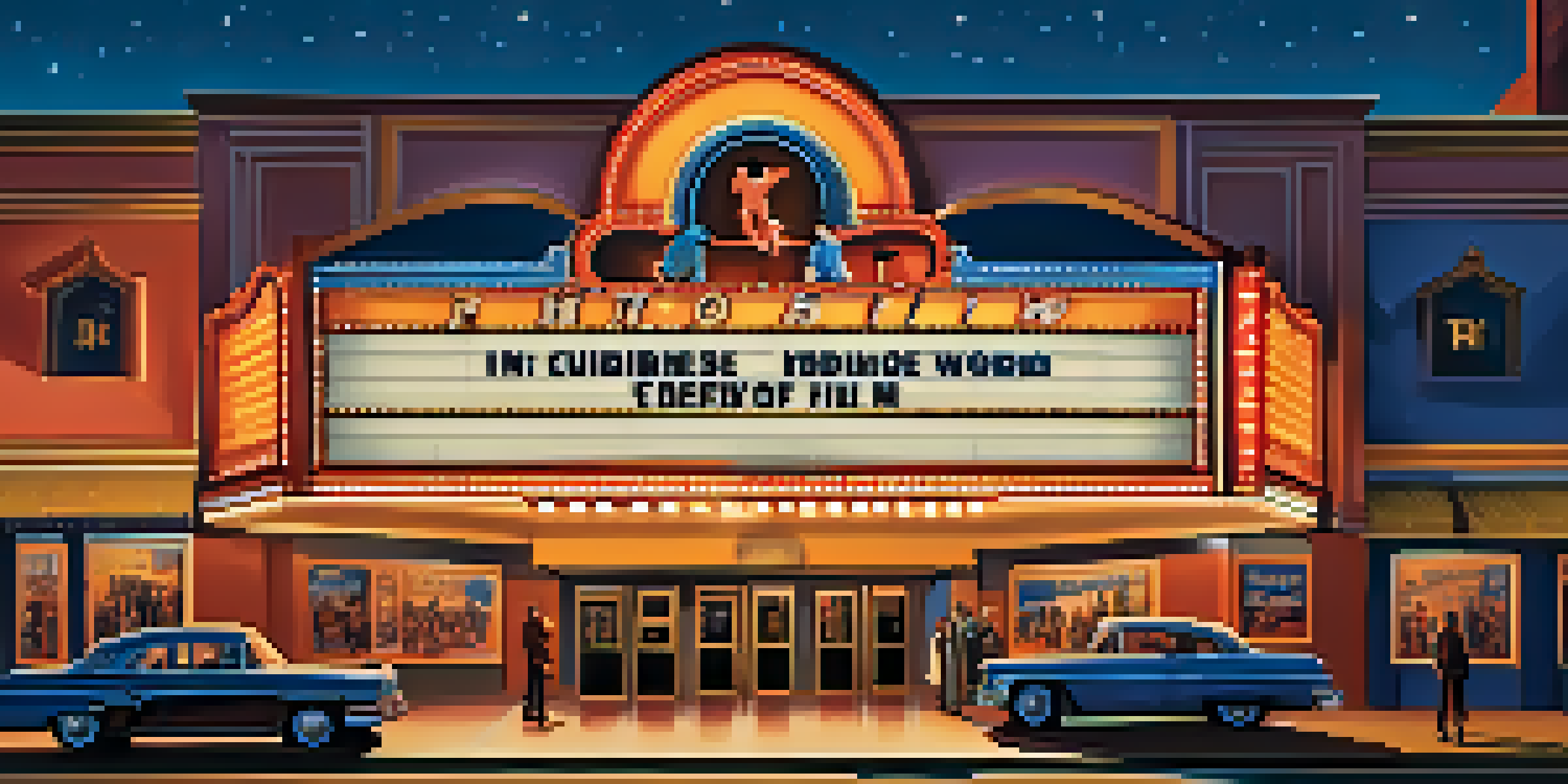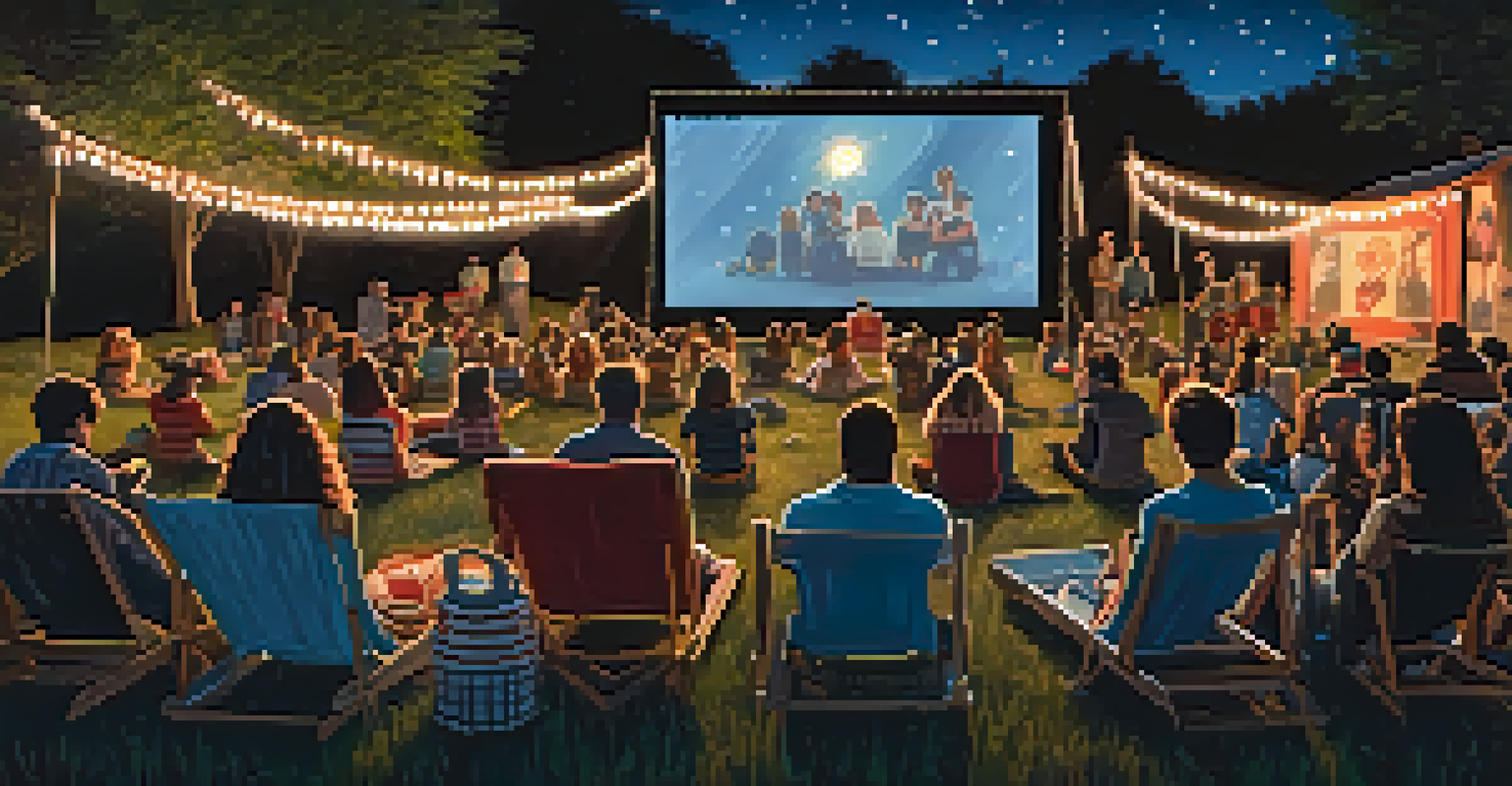The Importance of Themes in Cult Classic Storytelling

Understanding Cult Classics: What Sets Them Apart
Cult classics are films or stories that develop a dedicated fanbase, often despite initial poor reception. They stand out due to their unique storytelling, memorable characters, and engaging themes that resonate deeply with audiences. Unlike mainstream hits, cult classics often embrace unconventional narratives that invite deeper exploration and discussion.
A film is never really good unless the camera is an eye in the head of a poet.
These stories often revolve around themes that challenge societal norms or explore the human condition in unconventional ways. For example, movies like 'The Rocky Horror Picture Show' tackle themes of identity and acceptance, resonating with audiences who feel marginalized. This connection creates a community around the film, fostering loyalty and repeated viewings.
Ultimately, what sets cult classics apart is their ability to evoke strong emotional responses through their themes. They create a space where fans can find solace in shared experiences, making them memorable long after their release. This emotional engagement is what allows these films to transcend time and trends.
Thematic Depth: What Makes a Theme Powerful?
A powerful theme is one that resonates on multiple levels, allowing viewers to interpret it through their own experiences. It taps into universal truths or struggles that many people face, such as love, loss, or the search for identity. This depth invites audiences to reflect on their own lives, fostering a personal connection to the story.

For instance, in 'Donnie Darko,' themes of time travel and existentialism force viewers to confront their perceptions of reality and fate. The film's exploration of mental health and adolescence is layered, offering something new with each viewing. This complexity is part of what keeps fans coming back, as they uncover different meanings each time.
Cult Classics Foster Deep Connections
These films create emotional bonds through relatable themes and characters that resonate with audiences, often leading to a dedicated fanbase.
Moreover, themes can serve as allegories for societal issues, sparking conversation and encouraging audiences to think critically. They challenge viewers to not only enjoy the story but also engage with broader implications. This interplay between entertainment and reflection is what often elevates a film to cult classic status.
Relatable Characters: The Heart of Thematic Connection
Characters act as vessels for themes, allowing audiences to experience them on a personal level. When viewers see parts of themselves in characters, it deepens their connection to the story. Cult classics often feature protagonists who are flawed or unconventional, making them relatable and memorable.
Art is the most beautiful of all lies.
For instance, in 'The Breakfast Club,' each character embodies different high school stereotypes, yet they all share the common theme of self-discovery. Their journey of breaking down social barriers resonates with anyone who has faced similar challenges. This relatability fosters empathy and understanding, making the themes more impactful.
By creating characters that embody specific themes, filmmakers invite audiences to reflect on their own lives. These connections often spark conversations about shared experiences and feelings, solidifying the film's place in the hearts of fans. The emotional investment in these characters enhances the overall appreciation of the themes presented.
Cultural Reflection: Themes as Mirrors of Society
Cult classics often reflect the cultural and social climates of their time, making their themes particularly poignant. They hold a mirror to society, exposing truths that may be uncomfortable but necessary to confront. This reflection can resonate with audiences, creating a sense of solidarity in shared experiences.
For example, 'Fight Club' critiques consumer culture and masculinity, themes that sparked significant discussion when it was released. The film encourages viewers to question societal norms and their own identities, making it both a product and a critique of its era. This duality is what keeps the film relevant, even years later.
Themes Reflect Cultural Context
Cult classics serve as mirrors to society, addressing contemporary issues and encouraging viewers to confront uncomfortable truths.
When themes resonate with the cultural zeitgeist, they foster a connection that transcends generations. Audiences identify with the struggles and triumphs depicted, often finding parallels in their own lives. This relevance solidifies the film's status as a cult classic, as it continues to speak to new audiences over time.
Subversive Storytelling: Themes That Challenge Norms
Many cult classics thrive on subverting traditional storytelling tropes, often through their thematic choices. This defiance of expectations invites audiences to engage with the story in new and unexpected ways. By challenging norms, filmmakers create a sense of intrigue that draws viewers in and keeps them guessing.
Take 'Pulp Fiction,' for instance, which plays with non-linear storytelling and themes of morality. The unconventional structure and gritty themes push boundaries, encouraging audiences to reconsider their own perceptions of right and wrong. This unpredictability is a hallmark of cult classics, as fans are often left pondering the story long after it ends.
By embracing subversive themes, filmmakers can inspire critical dialogue and provoke thought. This not only enriches the viewing experience but also solidifies the film's legacy within the cult classic genre. It creates a space where audiences can challenge their own beliefs and engage with complex ideas.
Nostalgia and Themes: A Powerful Combination
Nostalgia plays a significant role in the appeal of cult classics, often intertwined with their themes. Many fans find comfort in revisiting stories that evoke cherished memories or past experiences. This connection to the past can amplify the impact of the themes presented, making them resonate even more profoundly.
For example, 'The Goonies' taps into themes of adventure and friendship, reminding audiences of the innocence of childhood. As viewers relive their own youthful escapades through the characters' journeys, the film becomes a nostalgic touchstone. This emotional connection is a key reason why fans remain devoted to cult classics.
Nostalgia Enhances Thematic Impact
The blend of nostalgia and powerful themes in cult classics allows audiences to relive cherished memories, deepening their connection to the story.
By blending nostalgia with relevant themes, filmmakers can create an experience that transcends generations. Audiences not only enjoy the story but also reflect on their own growth and experiences. This synergy between nostalgia and thematic depth is what keeps cult classics alive in the hearts of fans.
The Enduring Legacy of Themes in Cult Classics
The themes explored in cult classics often leave a lasting impact, shaping how we perceive storytelling. These films not only entertain but also provoke thought and discussion, making them significant in the cultural landscape. Their ability to address complex topics in relatable ways ensures their relevance over time.
By tackling universal themes like love, identity, and societal critique, cult classics invite audiences to reflect on their own lives. This introspection fosters a deep connection between fans and the story, solidifying the film's place in popular culture. As new generations discover these films, the themes continue to resonate and inspire.

Ultimately, the enduring legacy of cult classics lies in their powerful themes. They remind us of the importance of storytelling as a means of connection and understanding. As long as there are stories to tell, the themes of cult classics will continue to find a place in the hearts of audiences everywhere.